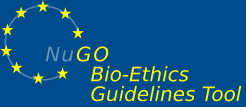- Home
- NuGO Guidelines
-
Definitions
-
Examples
-
Background
-
This is a static version of the NuGO Bioethics Guidelines Tool from 2007. Some links may be outdated. Searching is disabled. Please contact the authors for comments or questions
General principles: Genotype Information
- There must be no discrimination or stigmatization of a person based on the genetic heritage. Nutrigenomics researchers should be sensitive to the potential problem of stigmatization and should seek advice of experts in social sciences and law where appropriate.
- Genotyping that will allow predicting high disease susceptibility is only acceptable to be disclosed in a research context if it is subjected to appropriate genetic counselling (see also Recommendations for the training and qualifications of nutrigenomics specialists...).
- The right to respect private life, as stated in the Article 8 of the European Convention on Human Rights and Fundamental Freedoms, implies the right to know any information collected on one person's health. Wishes of individuals not to be informed should be respected.
Relevant documents
[ 1 ] Convention for the Protection of Human Rights and Dignity of the Human Being with regard to the Application of Biology and Medicine: Convention on Human Rights and Biomedicine, Oviedo 4.IV.1997
[ 4 ] Universal Declaration on the Human Genome and Human Rights
[ 5 ] Report on Confidentiality and Genetic Data
[ 59 ] Brandt-Rauf, SI - Ashkenazi Jews and Breast Cancer: The Consequences of Linking Ethnic Identity to Genetic Disease
